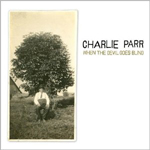|
|
 |
Dusted Reviews
Artist: Charlie Parr Album: When the Devil Goes Blind Label: Nero’s Neptune Review date: Dec. 10, 2010 |

|
|
|
 |
The times you grow up in can shape you, but so does the household where you were raised. Charlie Parr’s dad was born in 1922, worked in a Hormel plant until his body gave out, organized for the union, and played Mance Lipscomb, Elizabeth Cotton, and Dock Boggs records when the kids wanted to hear that new-fangled stuff by The Beatles and Minutemen. Parr may have been born during the Nixon era, but you can taste the grit of the Dust Bowl in his music. Nowadays, Parr’s punk rock past isn’t nearly as noticeable as his dad’s old Folkways LPs. He plays banjo and a pair of resonator guitars, sings in a gravelly voice, and performs most of his gigs on a far Northern circuit of small bars located in burgs like Winona, St. Cloud and Duluth, Minn.
But even if he doesn’t sound terribly modern, the modern world has found him. Parr has fans in Australia, where he’s contributed to film soundtracks and had his song “1922” used in a cell phone commercial. And fellow Duluth townies Low are not only touring the West Coast with him this month, but will bring him on stage to play some Christmas songs.
More important, Parr recognizes that no matter how insular a world you wish to live in, the outside world will find you. For every gospel song that sounds like it was forged in pre-Edisonian tents or reference to a 19th century folk hero, there’s another about foreclosure or some homeless guy with PTSD.
So, Parr has made a record that makes it a little easier for the world to come to him. Bo Ramsey, producer and sideman for Greg Brown and Lucinda Williams, has given When The Devil Goes Blind a sonic clarity that’s a far cry from the homemade, monaural grime of Parr’s last album, Roustabout. This actually does his guitar playing some favors; the opening notes of “1890” might stick with you almost as close as Parr’s brokenhearted narrative of the Wounded Knee massacre, and its coda hovers in a way that brings to mind Ry Cooder’s soundtrack to Paris, Texas more than Blind Willie Johnson. But the focus is on the stories, which Parr puts across with good old-fashioned earnestness.
By Bill Meyer
|







